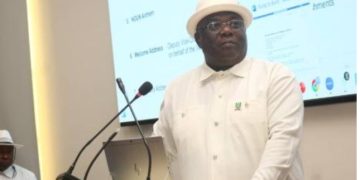The National Identity Management Commission, NIMC, has unveiled strategies to strengthen public trust and deepen transparency to ensure inclusive access to digital identity in Nigeria.
The commission disclosed this during a two-day roundtable discussion with the Association of Corporate Online Editors, ACOE, in Abuja on Friday.
In her keynote address at the event themed ‘Building Trust in Digital Identity: Strengthening Media Partnerships for a Secure and Inclusive Ecosystem,’ director-general of NIMC, Dr. Abisoye Coker-Odusote commended the vital role the media plays in shaping public discourse, promoting government transparency, and serving as a bridge between policy and the people.
Coker-Odusote, representing by Dr. Alvan Ikoku, highlighted the transformation of Nigeria’s identity ecosystem from a fragmented and exclusionary system to a people-centred, secure, and unified platform.
She announced that enrolment in the National Identity Number, NIN, system has grown from 72.7 million in 2022 to over 122 million by July 2025 a 49% increase in just over three years.
According to her, this increase has enabled millions of Nigerians to access services in education, health, agriculture, and financial sectors, further empowering the country’s underserved populations.
“The commission’s investment in digital infrastructure, automation, and backend upgrades has improved service delivery, with special tools such as the NINAuth mobile app, Self-Service Enrolment app, and Contactless Biometric Solutions already deployed.
“Key institutional reforms outlined during the event include curtailment of extortion and unofficial fees by 40%, A transparent, standardised fee structure for modifications and authentication and Payment of all backlog debts owed to enrolment partners.
“Strategic collaborations with critical MDAs such as NHIS, FIRS, JAMB, INEC, CBN, NCC, NCoS, FRSC, and PENCOM were showcased. These partnerships have streamlined identity verification processes across corrections, education, health, and pension services.
“NIN-enabled systems now support access to student loans (via NELFUND), agricultural subsidies, enterprise funding (SMEDAN, BOI), and workers’ compensation (NSITF), among others,” she said.
She informed that the upcoming General Multipurpose Card, GMPC, expected in October 2025, wouls provide citizens with a secure, multifunctional ID that allows seamless access to government services, banking, health insurance, and digital platforms.
In her remarks, the project coordinator of the Nigeria Digital Identification for Development, ID4D, Mrs. Tito Ejanavi reaffirmed ID4D’s support for inclusive enrolment efforts, especially among vulnerable groups such as women, persons with disabilities, children, and rural dwellers.
Ejanavi added that through the ID4D project, funded by the World Bank, French Development Agency, and the European Investment Bank, over 7,167 Front-End Enrolment Agents have been trained and deployed nationwide.
In addition, she disclosed that infrastructure upgrades, biometric identification improvements, and strategic reforms have enhanced national enrolment coverage, equity, and security.
“We are not only investing in systems but in people. Through workshops, stakeholder dialogues, and grievance redress training, our teams are now better positioned to serve Nigerians more effectively,” Ejanavi said.
She commended the DG for her visionary leadership and reaffirmed the project’s commitment to sustaining media engagement.
In his address, ACOE president, Mr. Shola Akingboye commended NIMC’s efforts and reiterated the media’s commitment to transparency and public education.
Akingboye acknowledged previous roundtable engagements, including one in November 2024, and emphasised the importance of sustained dialogue between NIMC and the online media space to dispel misinformation and educate citizens about the value of identity management.







































